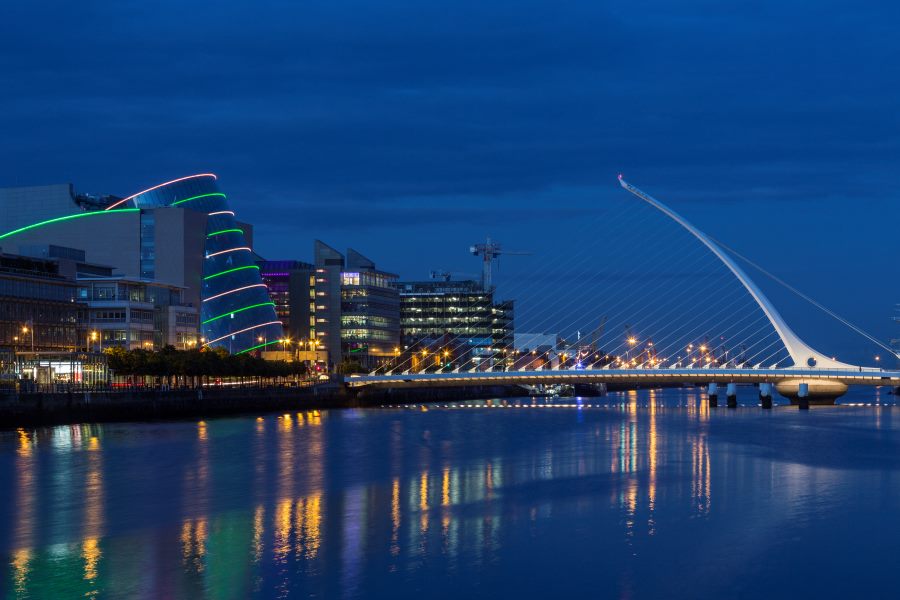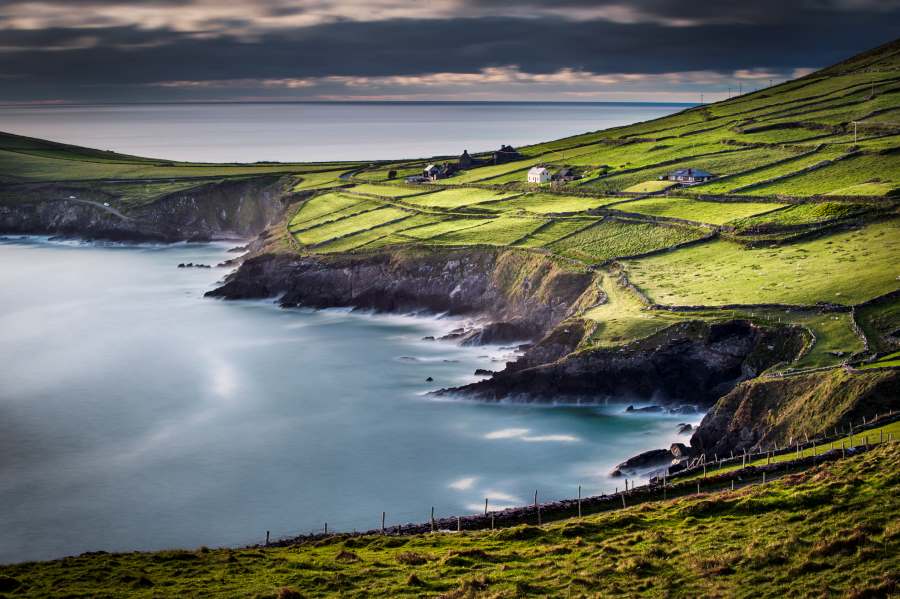
Premium Starting ₹395

24x7 Missed Call Facility



Travel Insurance
Trip Type
- Country
- Geography

Premium Starting ₹395

24x7 Missed Call Facility


Best Time to Visit Ireland from India

One can visit Ireland throughout the year because of its temperate climate. However, the best time to visit Ireland for a memorable vacation are June to August, March to May and September to November.
One unique component of Ireland's climate is that it can rain at any time of the day here all year round. You need to know the best season to visit this European country when there’s less rain and slightly warmer temperatures. Now, go enjoy a pint of Guinness in the lush meadows of Ireland!

Table of Contents

Best Months/Seasons to Visit Ireland
If you are trying to find the best seasons for travelling to Ireland, follow the list discussed below:
| Month | Average Temperature | Description |
| March-May (Spring Season) | 8 to 12 Degrees Celsius | Mild temperatures are perfect for exploring the lush countryside, visiting historical sites, and enjoying the blossoming landscapes and gardens. Popular events during this time: St. Patrick's Day celebrations, Fleadh Nua, and Beltane Fire Festival. |
| June-August (Summer Season) | 16 to 22 Degrees Celsius | Warm weather is ideal for coastal trips, enjoying the vibrant music festivals, and exploring the beautiful scenery and beaches. Popular events during this time: Bloomsday, Galway International Arts Festival, and the Rose of Tralee Festival. |
| September-November (Autumn Season) | 14 to 18 Degrees Celsius | Mild temperatures highlight the vibrant autumn foliage, perfect for scenic drives and seasonal food and drink. Popular events during this time: Galway International Oyster Festival, Dublin Theatre Festival, and Halloween celebrations in Derry. |
| December-February (Winter Season) | 4 to 10 Degrees Celsius | Cool temperatures with fewer tourists, ideal for cosy pub experiences, exploring historical sites, and enjoying festive holiday markets and events. Popular events during this time: Dublin's New Year Festival, Christmas markets, and St. Stephen's Day festivities. |
March-May (Spring Season)
Spring in Ireland is a period of green countryside and blooming wildflowers. At this time, temperatures are cool, and there are longer days for visiting places like the Cliffs of Moher or the Ring of Kerry. The St. Patrick's Day festivities enhance this season by presenting the rich cultural heritage of Ireland.
Here are some of the key details you should know about this season when planning a trip to Ireland:
| Weather | Cold but pleasant |
| Temperature | 8°C to 12°C |
| Season | Moderate to Peak |
| Season for Localities | St. Patrick's Day celebrations, Wine Festival, Fleadh Nua, and Beltane Fire Festival |
| Key Highlights |
|
June-August (Summer Season)
Summer in Ireland is described as lush greenery under sunny skies, which makes it perfect to discover Wild Atlantic Way's rough coasts or even Connemara's peacefulness. Enjoy attending outdoor festivals that showcase Irish music and culture. On the other hand, Dublin, among other busy towns, has a vibrant nightlife and historical sites like Trinity College, Dublin Castle, etcetera.
Here are some of the key details you should know about this season when planning a trip to Ireland:
| Weather | Pleasant with occasional showers |
| Temperature | 16°C to 22°C |
| Season | Peak |
| Season for Localities | Bloomsday, Galway International Arts Festival, and the Rose of Tralee Festival |
| Key Highlights |
|
September-November (Autumn Season)
As autumn approaches, the Irish landscape welcomes it, with trees taking on golden and reddish hues as leaves change colour. It is an opportune time to visit historical castles like Blarney Castle or Kylemore Abbey, which have fewer tourists.
Furthermore, refreshing brisk strolls over beautiful trails conclude on warm nights where you can relax near an open fire, savouring hearty food such as Irish stew and fresh soda bread in old-fashioned Irish pubs.
Here are some of the key details you should know about this season when planning a trip to Ireland:
| Weather | Pleasant and rainy |
| Temperature | 14°C to 18°C |
| Season | Moderate |
| Season for Localities | Galway International Oyster Festival, Dublin Theatre Festival, and Halloween celebrations in Derry |
| Key Highlights |
|
December-February (Winter Season)
During winter, Ireland provides warm comfort with pubs whose fires roar and hospitality everywhere. It is a great time to visit historic sites like Trinity College in Dublin or the old Glendalough ruins, normally covered by snow. There are Christmas markets with locally made crafts and seasonal delights to allow you to enjoy traditional Irish dishes such as hot whiskey and colcannon.
Here are some of the key details you should know about this season when planning a trip to Ireland:
| Weather | Cold with heavy rains |
| Temperature | 4°C to 10°C |
| Season | Off |
| Season for Localities | Dublin's New Year Festival, Christmas markets, and St. Stephen's Day festivities |
| Key Highlights |
|
When to Avoid Visiting Ireland?

However, as lovely as Ireland is all year round, it is advisable to only visit during winter if you are ready for extreme coldness and very short daylight hours. The coldest and darkest spell starts from early November to February, which may not be favourable for outdoor activities or colourful cultural events.
| Months to Avoid | Reason |
| December to February (Winter Season) |
|
Seasonal Travel Costs of Visiting Ireland from India
Flying from India to Ireland could be quite affordable, depending on your travel dates. Over the years, flights and hotels have different prices for their services. Below is an elaborate table showing the different months/seasons with respective price levels in respect of several parameters:
| Season | Average Flight Cost | Average Hotel Cost per Night | Description |
| Spring (March-May) | ₹45,000 - ₹60,000 | ₹9,000 - ₹17,000 | Moderate prices; ideal for exploring cities and outdoor activities with mild weather. |
| Summer (June-August) | ₹50,000 - ₹75,000 | ₹10,000 - ₹20,000 | Peak season with higher prices due to increased tourism; perfect for outdoor festivals and exploring coastal beauty. |
| Autumn (September-November) | ₹35,000 - ₹50,000 | ₹11,000 - ₹17,000 | Moderate season with pleasant weather; great for scenic drives and cultural explorations. |
| Winter (December-February) | ₹30,000 - 45,000 | ₹8,000 - ₹15,000 | Off-season with moderate prices; ideal for enjoying cosy pub evenings and festive markets. Skiing and snow activities are popular. |
Things to Know Before Visiting Ireland
Below are certain things that you must know before visiting Ireland. These will come in handy while you are on vacation in this European country:
- Big cities like Belfast and Dublin will have a lot to offer you in terms of visiting museums and pubs. However, Ireland's small towns and villages have a charm of their own. So, make sure to include the villages and towns in your travel plan.
- In Ireland, restaurants and pubs do not serve food all day long. For instance, a restaurant is open after lunch but will only serve you drinks and no food during this time. So plan your meals beforehand and then plan your travel for the day.
- There is no tipping system at restaurants in Ireland. So make sure you do not tip the servers.
- Consider renting a car if you want to explore the country via road.
- Northern Ireland and Ireland are very different from each in terms of geography and currency. You must always remember that Northern Ireland is still a part of the United Kingdom and Ireland is an independent country.
Tips for Travelling in Ireland
Here we have curated a list of tips that you might find useful when you travel to Ireland:
- Avoid making offensive jokes that are stereotypical and outright rude. Some of these jokes may include the topics of Potato Famine and leprechauns, so do not joke about such issues.
- It rains a lot in Ireland, so bring your umbrella with you.
- Most stores are not open on Sundays, so do not plan for a shopping trip on Sundays.
- Do take a guided tour if you are visiting touristy places. This way, you will be able to learn more about the culture.
- Weather in Ireland is unpredictable throughout the year, so be prepared to get wet at any time of the day if you are exploring outside.
What Phrases Should You Know Before Travelling to Ireland?
People in Ireland speak in English, but some phrases are only used in Ireland. Knowing such phrases will only help you to bond better with the locals. Here are such words:
| English | Irish Phrases/Words |
| The toilet | The jacks |
| An idiot | Eejit |
| How are you? | How’s she ‘cuttin’? |
| We’re making progress | We’re suckin’ diesel |
| The police | The guard |
| Soft drinks | Minerals |
| Fries | Chips |
| Fun | Craic |
| Incorrect | Arseways |
| Messing | Acting the maggot |
| Hello | Dia dhuit! |
| Bye | Slán! |
| Well done | Fair play |
| Very | Quare |
| I likely won't | Is dócha nach mbeidh |
| Excuse me | Gabh Mo Leithscéal |
| Yes | Ta |
| No | Nil |
| Cheers! | Sláinte |
| Welcome | Fáilte |
| Goodbye | Slán |
| Sandwich | Sandbow |
| Great, fine, okay or alright | Grand |
| You | Ye |
| Broken | Banjaxed |
If you are wondering when the best time to visit Ireland is, you must remember that the rain and sun will be a constant fixture in Ireland's weather. Ireland has unique weather conditions because it is situated in the Atlantic Ocean, and strong winds from the Gulf Stream always pass through this country.
Furthermore, it would be best if you took travel insurance before starting your trip to Ireland. This is because the weather is unpredictable, and you might fall sick. Having such insurance will protect you from such unanticipated expenses overseas.













